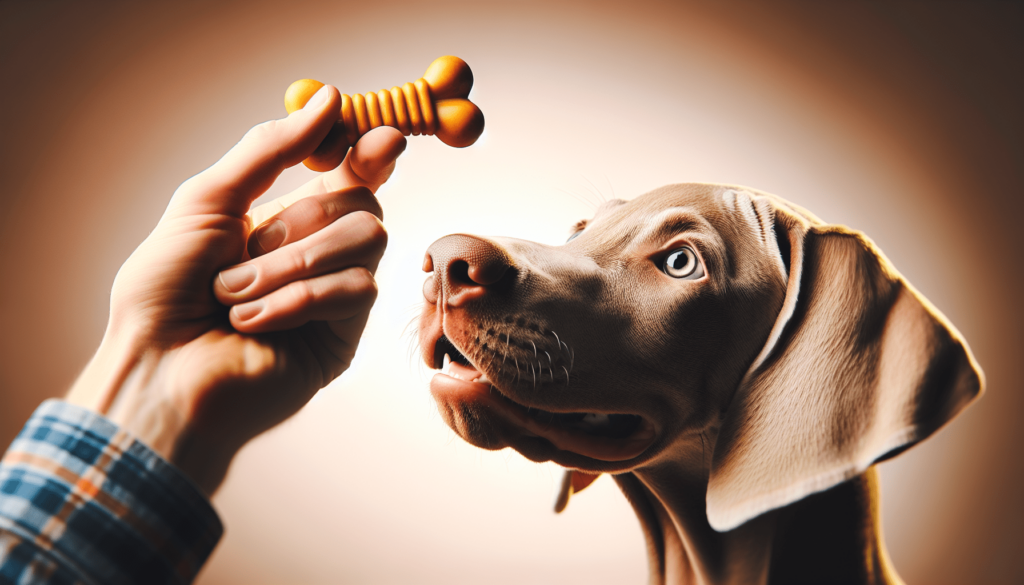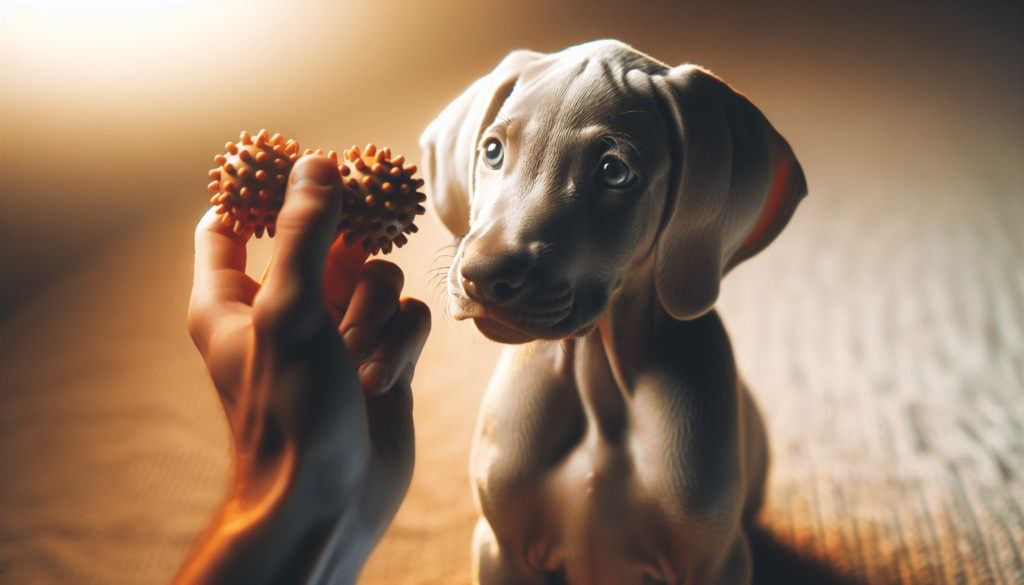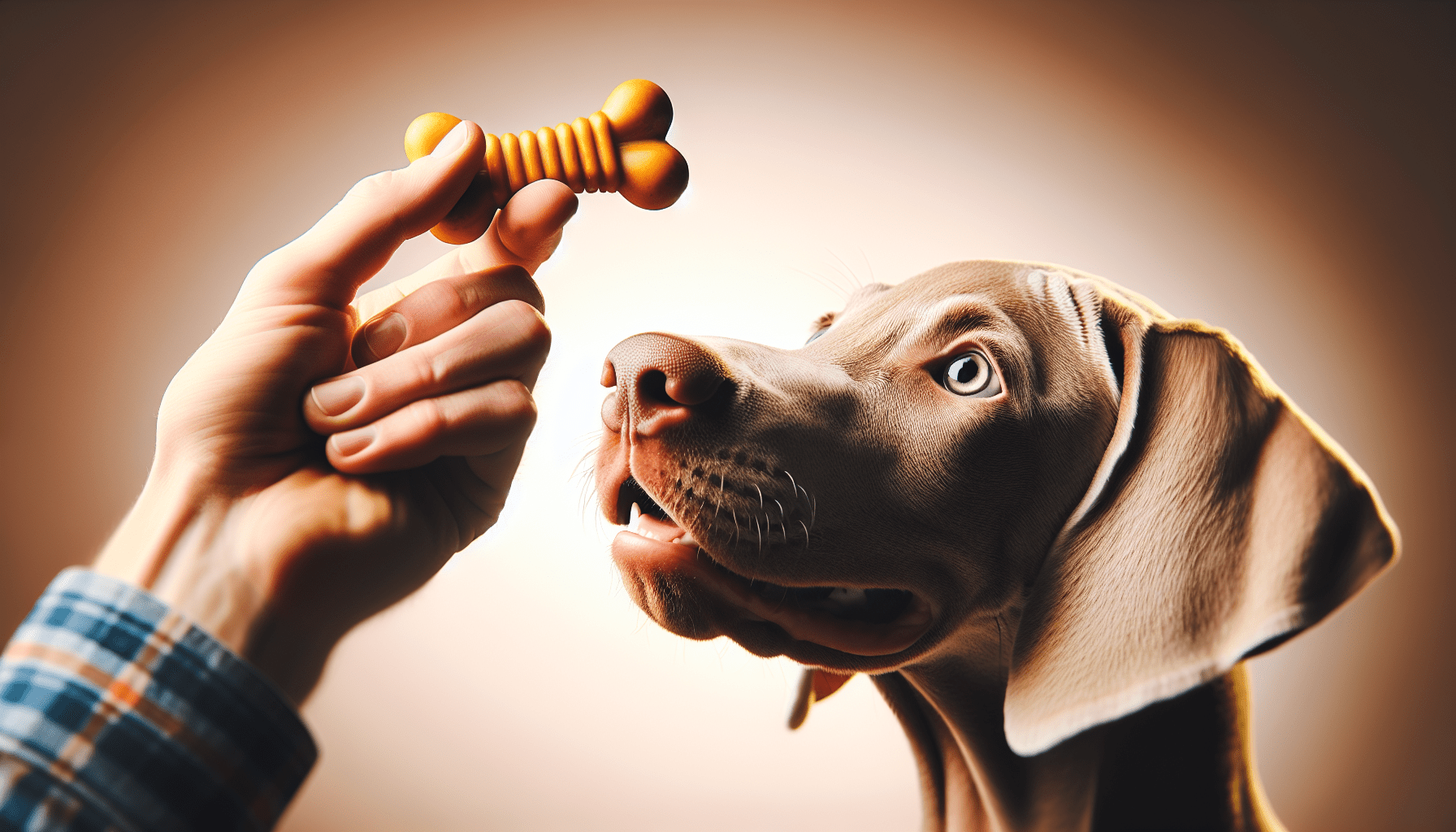Are you struggling with your Weimaraner puppy’s biting behavior and desperately searching for effective techniques to put an end to it? Look no further! This article will provide you with practical tips and strategies on How to Train Your Weimaraner Puppy to stop biting. With these valuable techniques, you’ll be able to foster a healthy and well-behaved relationship with your furry friend. Say goodbye to those painful puppy bites and hello to a well-mannered Weimaraner!

Understanding the Behavior
The natural instinct to bite
It’s important to understand that biting is a natural behavior for puppies, including Weimaraners. Puppies explore the world with their mouths, and their sharp teeth are their primary tool for doing so. It’s instinctual for them to mouth and bite on objects, including our hands and feet.
Teething phase
Another reason why puppies, including Weimaraners, tend to bite is the teething phase. Just like human babies, puppies go through a teething process where their baby teeth are replaced by adult teeth. This can cause discomfort and itchiness in their gums, leading them to chew and bite to relieve the discomfort.
Attention-seeking behavior
Sometimes, puppies bite to get attention. They have a natural desire to be close to their human companions, and they may resort to biting as a way to engage with you and get your attention. It’s important to differentiate this type of biting from aggressive behavior, as attention-seeking biting is usually accompanied by wagging tails and a playful demeanor.
Setting Boundaries and Consistency
Establishing rules from the beginning
Setting clear rules and boundaries from the beginning is crucial in teaching your Weimaraner puppy not to bite. Make it clear that biting is not acceptable behavior. Establish and communicate this to your puppy consistently throughout their training process.
Consistent reinforcement
Consistency is key when it comes to training a Weimaraner puppy not to bite. Ensure that everyone in your household is on the same page and follows the same rules. Inconsistency can confuse your puppy and make it difficult for them to understand what is expected of them.
Avoiding mixed signals
Be mindful of any unintentional mixed signals you may be sending to your Weimaraner puppy. For example, if you play rough games with your hands and then expect your puppy not to bite during other interactions, it can be confusing for them. Consistency in your actions and expectations will help your puppy understand what is acceptable behavior and what is not.
Positive Reinforcement
Rewarding good behavior
Positive reinforcement is a highly effective method for training your Weimaraner puppy not to bite. Whenever your puppy displays appropriate behavior by not biting, reward them with treats, toys, or verbal praise. This helps them associate good behavior with positive outcomes and encourages them to repeat it.
Using treats and toys
Incorporate treats and toys into your training sessions to redirect your Weimaraner puppy’s biting behavior. When your puppy starts biting, offer them a chew toy or a treat to redirect their attention away from your hands or other objects they are biting. This teaches them to associate biting with appropriate objects.
Verbal praise and affection
Along with treats and toys, verbal praise and affection are powerful tools for reinforcing good behavior in your Weimaraner puppy. Whenever your puppy successfully avoids biting or responds to redirection, shower them with verbal praise and show them affection. This positive reinforcement helps strengthen the desired behavior.
Redirecting Behavior
Distracting with toys
Whenever your Weimaraner puppy starts biting, it’s important to redirect their attention to appropriate chew toys. Keep a variety of toys readily available and offer them when you notice your puppy’s biting behavior. This helps them understand what is acceptable to bite on and what is not.
Engaging in interactive play
Interactive play sessions are excellent opportunities to redirect your Weimaraner puppy’s biting behavior. Engage them in games that require them to focus on toys rather than your body parts. This teaches them that toys are fun and satisfying to bite on, while human skin or clothing is off-limits.
Teaching appropriate bite inhibition
Teaching your Weimaraner puppy appropriate bite inhibition is crucial for their socialization and future interactions with other dogs and people. Whenever your puppy bites harder than desired, let out a high-pitched yelp or say “ouch” in a firm but non-threatening manner. This teaches your puppy that biting too hard causes discomfort and helps them learn to control their bite force.

Ignoring and Time-Outs
Reacting calmly to biting
If your Weimaraner puppy bites despite your best efforts to redirect their behavior, it’s important to react calmly. Avoid screaming or yelling, as this may frighten or confuse your puppy. Instead, make a brief but assertive sound like “uh-uh” or “no” to communicate that biting is not acceptable.
Withdrawing attention
One effective way to discourage biting is to withdraw your attention from your Weimaraner puppy immediately after a bite occurs. Stand up and turn away from them, avoiding eye contact or any interaction for a short period. This sends a clear message that biting leads to a loss of the desired attention and can help deter the behavior.
Using time-outs to convey consequences
If your Weimaraner puppy continues to bite even after you have withdrawn your attention, you can use time-outs as a more severe consequence. Place your puppy in a safe and quiet area, such as a crate or a designated space, for a minute or two. This gives them time to calm down and understand that biting results in isolation from the fun and engaging activities.
Socialization and Bite Inhibition Training
Ensuring exposure to various environments
Socialization is an essential aspect of training a Weimaraner puppy not to bite. Expose your puppy to different environments, such as parks, streets, and other homes, to help them develop confidence and familiarity in different surroundings. This exposure also helps them learn appropriate behavior in various situations.
Introducing to different people and animals
Introduce your Weimaraner puppy to different people and animals, but always ensure the encounters are positive and controlled. This helps your puppy develop good social skills and learn appropriate interactions. By exposing them to different individuals and animals, you can teach them to be gentle and respectful, reducing the likelihood of biting.
Teaching gentle mouthing
While it may sound contradictory, teaching your Weimaraner puppy to mouth gently can help in bite inhibition training. Encourage them to interact with your hands and other body parts by gently mouthing and licking, rather than biting. If your puppy starts biting too hard, immediately withdraw your hand and redirect them to a suitable toy. This teaches them to be gentle, even during play.
Teaching the ‘Leave It’ and ‘Drop It’ Commands
Training commands for object relinquishment
Teaching your Weimaraner puppy the commands “Leave it” and “Drop it” is essential for bite prevention. Start by presenting your puppy with an object they are interested in, such as a toy or a treat. When they go to bite it, use the command “Leave it” and offer them a more appropriate toy. Repeat this training exercise regularly to reinforce the command and discourage biting on unsuitable objects.
Positive reinforcement for successful results
Positive reinforcement is crucial in training the “Leave it” and “Drop it” commands. Whenever your Weimaraner puppy obeys the command and relinquishes an object without biting, reward them with treats and praise. This helps them associate the desired behavior with positive outcomes and reinforces their understanding of the command.
Using these commands during play
Incorporate the “Leave it” and “Drop it” commands into your interactive play sessions with your Weimaraner puppy. Encourage them to let go of toys or objects when you give the command. This reinforces their understanding of the commands and helps prevent biting during playtime.
Avoiding Rough Play
Discouraging wrestling or aggressive games
Avoid playing rough or aggressive games with your Weimaraner puppy, as this can encourage biting and aggressive behavior. Wrestling games, tug-of-war, and any activity that promotes biting on human body parts should be discouraged. Opt for interactive games that involve toys and focus on positive and gentle interactions.
Redirecting energy with appropriate activities
Weimaraners are energetic dogs that require ample physical and mental stimulation. If your Weimaraner puppy shows a tendency to bite during moments of excess energy, redirect their energy into appropriate activities. Take them for regular walks, engage them in obedience training, and offer mentally stimulating toys or puzzles. A tired and mentally stimulated puppy is less likely to resort to biting behavior.
Creating a calm and peaceful environment
Creating a calm and peaceful environment in your home can contribute to curbing biting behavior in your Weimaraner puppy. Dogs, including Weimaraners, are sensitive to their surroundings and can exhibit hyperactivity or anxiety in chaotic environments. Provide a quiet and structured space for your puppy, as an environment that induces calmness can help reduce biting tendencies.
Seeking Professional Assistance
Consulting a professional dog trainer
If you are facing difficulties in training your Weimaraner puppy not to bite, it may be beneficial to consult a professional dog trainer. A professional can assess the specific needs of your puppy, provide personalized guidance, and develop a tailored training plan to address biting behavior.
Behavioral specialists or obedience classes
In some cases, more complex biting behaviors may require the help of a behavioral specialist or enrollment in obedience classes. These professionals specialize in addressing challenging behavioral issues and can provide the necessary guidance to tackle biting problems effectively and safely.
Getting personalized guidance
Every puppy is unique, and what works for one Weimaraner may not work for another. If you’re struggling with your Weimaraner puppy’s biting behavior, seeking personalized guidance from professionals can ensure that you receive tailored advice and training strategies that suit your specific situation.
Consistency, Patience, and Time
Raising awareness about biting triggers
By observing your Weimaraner puppy’s behavior, you can identify specific triggers that lead to biting. It could be certain actions, interactions, or even time of day. Raising awareness about these triggers allows you to anticipate and prevent situations that may lead to biting.
Setting realistic expectations
Training a Weimaraner puppy not to bite takes time and effort. Set realistic expectations and remember that progress may be gradual. Consistent training, reinforcement, and patience are key to achieving long-term results. Celebrate small victories along the way and remain dedicated to the training process.
Understanding that training takes time
Training a Weimaraner puppy not to bite is a process that requires time and understanding. It’s important to remember that puppies are learning and developing, and their biting behavior will not change overnight. Keep your expectations realistic and stay committed to the training techniques outlined above. With consistency, positive reinforcement, and patience, you can help your Weimaraner puppy overcome their natural instinct to bite and develop into a well-behaved adult dog.
